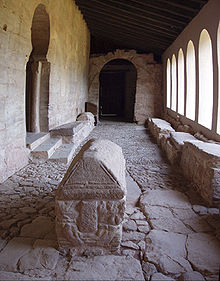
The Cantar de los Siete Infantes de Lara ("Song of the Seven Lara Princes") is a legend, perhaps derived from a lost cantar de gesta, that relates a tale of family feuding and revenge, centering on the murder of the eponymous seven infantes (princes) of Lara or Salas. The legend survives in prose form in medieval chronicles, the oldest being in the extended version of the Estoria de España (History of Spain) compiled during the reign of Sancho IV of Castile before 1289 (edited by Ramón Menéndez Pidal under the name Primera Crónica General).[1]
From the account found in this chronicle as well as mention in the Crónica de 1344 (Segunda Crónica General) and interpolations into a copy of the Tercera Crónica General dating from 1512, Menéndez Pidal found evidence for the existence of an ancient lost cantar de gesta that scholars have since partially reconstructed, dating back to the year 1000. This work would, along with the Cantar de Mio Cid and the Poema de Fernán González, represent one of the most important epic cantares of Castilian literature, and the most primitive example of the Spanish epic. The legendary tradition of the Infantes de Lara has also been developed through ballads. Some more recent scholars have rejected this, dating the story to shortly before the surviving prose versions.[2]
The Infantes de Lara were the children of Castilian nobleman Gonzalo Gustioz of Lara or Salas and his wife "Doña Sancha" (lady Sancha). The story revolves around a family feud, an escalating tit-for-tat cycle of revenge, between their family and that of Sancha's brother, Ruy Velázquez and his wife Doña Lambra.[3]